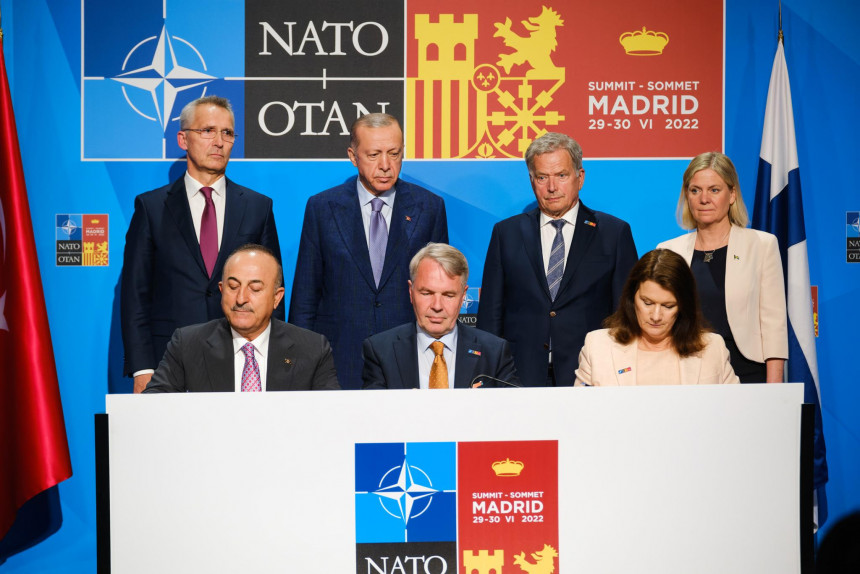Turkey has only supported the invitation of Sweden and Finland to join NATO, but the support for admission is yet to be decided

Early last week, Turkish President Recep Tayyip Erdoğan agreed to support the accession of Finland and Sweden to NATO. On June 28, Finland, Sweden and Turkey signed a memorandum in which Finland and Sweden undertook to deal promptly and thoroughly with Turkish requests for the extradition or deportation of those suspected of terrorism by Turkey.
Finland and Sweden also agreed to lift the 2019 embargo on arms supplies to Turkey. Turkey was promised by other NATO members to remove obstacles to the supply of Turkish-made arms to other NATO members. Following the signing of the memorandum, the Turkish President's Office released a statement saying that Turkey had "got everything it wanted" in the negotiations with Sweden and Finland.
The agreement between Finland, Sweden and Turkey was hailed as historic by many politicians and commentators, who called NATO's northward expansion a fait accompli.
However, this interpretation of the Madrid decision is not particularly correct. Turkey has only supported inviting Sweden and Finland to join NATO, but the Turkish Parliament will still decide whether to support the accession of both countries. If Turkey considers that Sweden and Finland are not fulfilling or sabotaging the memorandum, then the Turkish Parliament, in which the Turkish President has a non-decisive influence, will not support Sweden and Finland's admission to NATO. Turkish President Recep Tayyip Erdoğan stressed that Finland and Sweden must fulfil their promises to "fight terrorism" before the parliamentary vote. As the admission of new members to the North Atlantic Alliance requires the full support of all member states, a no vote by even one NATO member means a veto and the decision will not be taken. On the question of lifting the embargo on arms supplies, no problems are perceived, but on the question of extraditing terrorism suspects to Turkey, the issue is less clear-cut. First of all, different Turkish officials have given different numbers of persons to be extradited. Turkish Justice Minister Bekir Bozdağ said that Sweden should extradite 21 people belonging to the Kurdistan Workers' Party, a Kurdish separatist militant group banned in Turkey, as followers of exiled Islamist preacher Fethullah Gülen, who are blamed for the 2016 coup attempt. Finland, for its part, should extradite 12 suspects. The Turkish President announced that Sweden alone had promised to expatriate 73 persons. In the end, it was announced that the total number of terrorist suspects granted asylum in Finland and Sweden would be announced later.
The memorandum was interpreted by the Finnish and Swedish political leaders in a very different way from the Turkish announcement of a major diplomatic victory.
Finnish President Sauli Niinistö stressed that the memorandum did not name any individuals. Sauli Niinistö: "In the case of extraditions, we will adhere to our own legislation and international agreements. Ultimately, extradition is a legal discretion which politicians have no right to influence."
For her part, Swedish Prime Minister Magdalena Andersson said: "I know there are some people who are worried that we’re going to start to hunt people and extradite them, and I think it’s important to say that we always follow Swedish laws and international conventions, and we never extradite Swedish citizens."
In both Finland and Sweden, the current Turkish regime is considered by the majority of the population to be highly authoritarian and undemocratic, so the majority of the public will be siding with the people to be extradited. In both Sweden and Finland, the judiciary is independent and will rule according to the law and not according to political expediency. Moreover, it is possible that even in cases where a judgement unfavorable to the extraditees is foreseeable, one form of resistance could be to turn a blind eye to the fact that the potential extraditee leaves Sweden or Finland for a safer country.
Such a move could be perceived by the Turkish President as sabotaging the memorandum, which means that the end of the story of Finland and Sweden joining NATO is not yet in sight.